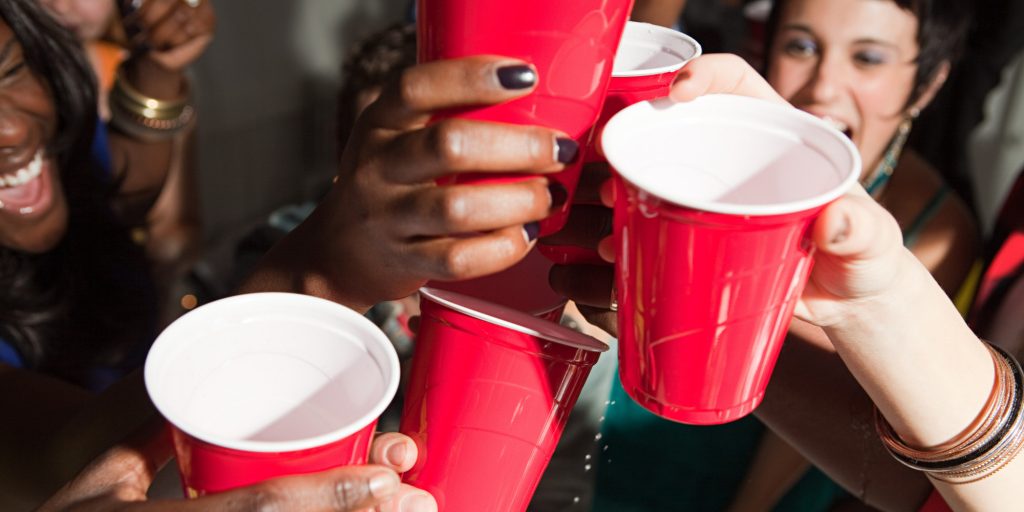Lauren Marler ’24
Staff Writer
Queggers have been a quintessential part of Scripps College’s nightlife since 2017. The name combines “queer” and “kegger,” and these parties celebrate queer identities and community. Zavi Feldstein ’20 was the creative mind behind the creation of the Queggers; they planned the first Quegger during their second year at Scripps and continued to plan 13 more until their graduation.
Feldstein explained that inspiration struck after talking with a friend at another liberal arts school, which had frequent events for queer women and nonbinary people. Considering that Scripps is historically a women’s college with a large queer community, Feldstein thought: “There are so many queer people around me, why aren’t we doing something similar?”
The first ever Quegger took place on Browning tower. It was a massive success, evidenced by the way campus security had to shut it down. Someone in the crowd who lived in CMC senior apartments offered to relocate the party to their apartment. So, the sea of Quegger-goers marched down to CMC.
“We were just parading with everything from the party down to CMC and that was how Queggers started,” said Feldstein. Since then, the Queggers have become infamous. Feldstein shared that during their time at Scripps, the parties ranged from around 80 to 120 people.
Queggers have always been community based, and all of the parties that Feldstein planned were crowdfunded. People volunteered to host in apartments or on balconies via Facebook. Fun cover photos were posted, sharing times and dates as well as creative themes. “I did the logistics, but Queggers wouldn’t have existed if the community wasn’t there, or there wasn’t a need and want, and a willingness to participate financially and physically,” Feldstein said.
Feldstein spoke about how coming to college can make us lose sight of why we chose Scripps, and the kind of community we wanted to be a part of. “There is a want for a queer, empowering, non-gendered community,” said Feldstein. They described Queggers as “social settings where there are no requirements,” which the Scripps community has consistently demonstrated a need for.
They also discussed how, though Queggers are intended for Queer women and nonbinary folks, everyone is invited. “Cis men are welcome to come as long as they are respectful of the space. It’s never been exclusive, it has been purposefully inclusive,” they said.
Queggers help to fill the need for queer nightlife on campus. For queer women and nonbinary people, 5C parties are often not comfortable or welcoming spaces.
“Going to these 5C parties and just getting hit on by men are very uncomfortable situations,” Feldstein said. “I thought that for myself and others, there could and should be a safe space to have a party and not have all of that energy.”
The feeling of safety sets Queggers apart from other 5C parties, as in Queggers, “You were surrounded by people who were not threatening, and part of your community. It’s supportive and a place of exploration,” Feldstein said. As a result of this amazing community, the Queggers have been the start to many queer relationships and friendships. “I think that’s really important,” Feldstein said.
With the Motley’s reopening on the horizon, Feldstein discussed the Quegger’s connections to the cafe. They worked at the Motley, which served as a convenient space for word of mouth Quegger invitations. “There is a relationship between the institutions on campus, that have motives of being inclusive and empowering the success of the first Queggers,” Feldstein said.
When Feldstein was graduating, they wondered, “Who do I hand the baton to? How is this going to continue?” However, Queggers continued naturally, with upperclassmen taking over the tradition. “I didn’t expect it to become a tradition and I am just amazed and so happy that it has been, because it definitely was filling a need,” said Feldstein.
Annika Ragnartz ’22, who attended many Queggers as a first-year and sophomore student, is one of the current seniors who is often involved in planning Queggers. Ragnartz and her suitemates wanted to continue the Quegger tradition after the interruption caused by the pandemic. “We decided that it was a tradition that deserved to live on, so we started them up again this year,” Ragnartz said.
Ragnartz also discussed how the Quegger has adapted over time, and become more widespread across the 5Cs. “I think, this year, the name has been sort of adopted as like, any queer party. The name has sort of taken on its own meaning, beyond what it maybe was before this year,” she said.
Similarly to Feldstein, Ragnartz felt that there is still a need for Queggers in the 5C community. “It’s honestly a really important part of the queer community at Scripps. A lot of the parties that are thrown are majority straight people. The parties themselves bleed into that heterosexual culture,” she said.
There have also been party themes, such as wedding party, that Ragnartz described as quintessentially heterosexual. “I think having specifically queer bodies, and specific queer nightlife, is really important because there is such a large queer community at the 5Cs,” she said.
The Queggers have become a unique aspect of the Scripps College experience, and a place of belonging. If you ever find yourself wondering what to do on a Friday or Saturday night, give a Quegger a try!
Image Source: Study Breaks



